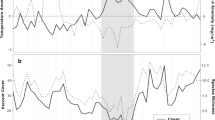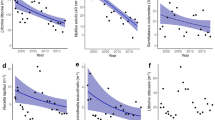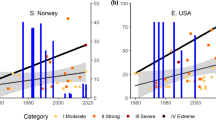Abstract
THE severe frost in the winter of 1939–40, some details of which were recorded in NATURE (145, 376; 1940), caused great destruction of oysters on the Thames Estuary oyster beds. Temperature readings in the Blackwater showed that the water reached 0° C. on January 1, and remained at about this level until February 19. Ice began to form on January 17, eventually forming floes which persisted for a month. Thick ice blocks were formed earlier in the shallow water of Whitstable (see accompanying illustration).
This is a preview of subscription content, access via your institution
Access options
Subscribe to this journal
Receive 51 print issues and online access
$199.00 per year
only $3.90 per issue
Buy this article
- Purchase on Springer Link
- Instant access to full article PDF
Prices may be subject to local taxes which are calculated during checkout
Similar content being viewed by others
References
Orton, J. H., and Lewis, H. M., J. Mar. Biol. Assoc, 17, 2 (1931).
Orton, J. H., J. Mar. Biol. Assoc., 24, i, 331–335 (1940).
Author information
Authors and Affiliations
Rights and permissions
About this article
Cite this article
ORTON, J. Effect of the Severe Frost of the Winter of 1939–40 on the Fauna of the Essex Oyster Beds. Nature 145, 708–709 (1940). https://doi.org/10.1038/145708a0
Issue Date:
DOI: https://doi.org/10.1038/145708a0
This article is cited by
-
Recent Breeding Phenomena in the American Slipper-Limpet, Crepidula Fornicata
Nature (1950)
-
Prof. E. J. Williams, F.R.S.
Nature (1945)
-
Effect of the Severe Winter of 1939–40 on British Oyster Beds
Nature (1940)
Comments
By submitting a comment you agree to abide by our Terms and Community Guidelines. If you find something abusive or that does not comply with our terms or guidelines please flag it as inappropriate.



